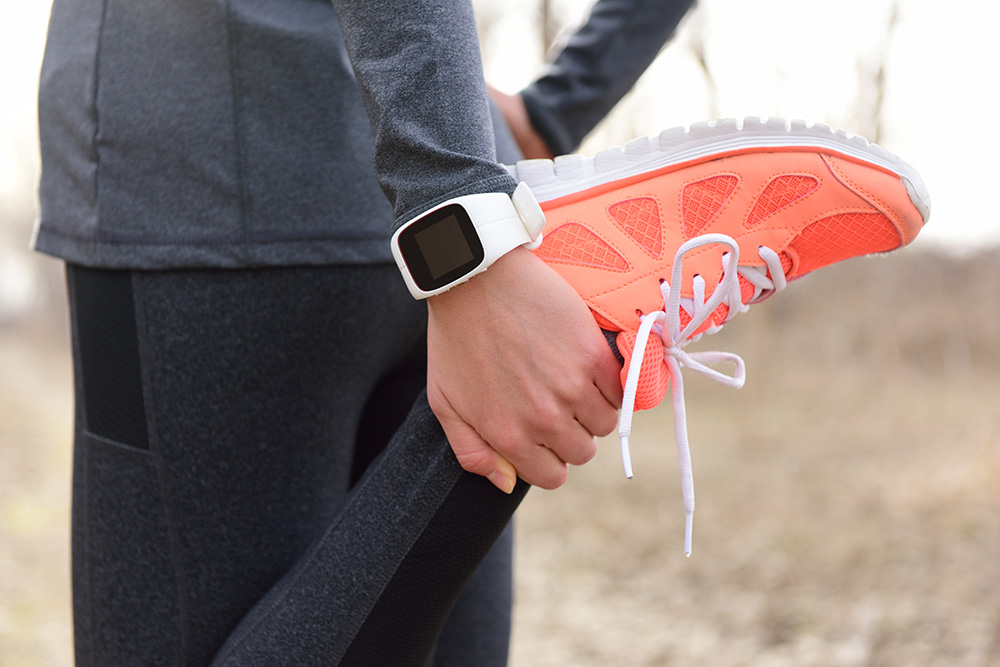
With the Coronavirus lockdown in place, a number of us have decided to develop and monitor our fitness with the extra time we have. But how accurate are fitness trackers?
What do trackers do?
These magic ‘wristwatches’ can help us to see how much (or little!) we do in terms of moving during the day. For the more discerning fitness fanatic, they show much more. The majority of fitness trackers will tally your daily step count, recognise workouts, measure your heart rate, count calories burned, distance covered and even quality of sleep. Some allow you to receive SMS messages, control your music playlist and check the weather!
There have been numerous studies performed on the accuracy of wrist-wearable tech with some surprising results. Studies vary from how accurate they are to how they may aid weight loss.
How is accuracy measured in the studies?
A study by Which? tested 85 trackers, ranging in activity from indoor and outdoor running to run-of-the-mill home life and lab studies.
For measuring the accuracy of steps and distance, the subjects in the Which? study walked on a calibrated treadmill at 4.8km/h for ten minutes and ran at 9-10 km/h for a further ten minutes. This allowed steps and distance to be logged and compared. The participants also performed daily tasks, such as carrying shopping, reading a magazine and loading a dishwasher.
The walking tests are also repeated to check accuracy. Wearing a tracker that isn’t consistent daily doesn’t help you to gauge if you are improving.
For the part of the study involving looking at the accuracy of calories burned, members wore a mask linked to a gas-analysis system. This then measured the intake of oxygen and carbon dioxide production with each breath. The tracker results are compared to gas-analysis data to find the most accurate devices for calorie counting.
The results proved that some watches were significantly inaccurate at tracking distance and calorie burning, while others were pretty much on the nail.
Garmin’s Vivosmart 4 performed the worst under trial for the distance of a marathon. You needed to run for almost 37 miles before the watch recognised the distance at 26.2 miles.
Others, such as Fitbit Zip and Misfit Ray came in under the distance too.
The Series 3 Apple watch came in under the distance of a marathon, telling runners they had completed the 26 miles when they had run 22 miles. Huawei’s Watch 2 had the runners finish a marathon at just over 18 miles!
The Garmin Vivoactive 3 was shown to be the most accurate for runners, showing there are discrepancies even with the brands. A spokesperson said the discrepancy between the two Garmin watches is that the Vivosmart 4 is an all-rounder and the Vivoactive has GPS to gauge distance more accurately.
Fitness trackers and weight loss
A study performed at the University of Pittsburgh aimed to see if trackers can help as part of a weight-loss plan. 471 people participated in the study, which had a low-calorie diet and increased exercise, and half were given a fitness tracker at the 6-month mark. By the end of a 24 month period, results were in. The people that weren’t given a tracker lost more weight! And by no small amount- there was an average difference of 2.4kg (5.2lb)
Many studies show that trackers may not help with weight loss BUT they do help many people by boosting their motivation to move more. They provide a visual that certainly helps, but not a strategy to help maintain any programmes for fitness.
How can some of the trackers get it so wrong?
For distance, some trackers are based on the number of steps you take rather than having built-in GPS systems. Errors can surface when you don’t have an option to enter the length of your stride so the tracker estimates it. This can vary greatly between someone at 4’10 compared to someone at 6’5, as you can imagine!
Trackers that have GPS built-in, or use your mobile phone’s GPS sensor, can track distance constantly and tend to be more accurate. There are fitness trackers designed specifically for runners to monitor distance.
Heart rate monitors can be fairly accurate when measuring your rate when resting but can vary during a workout. As exercise intensifies, getting sweaty can have a knock-on effect on how well your heart rate is measured. Trackers are likely to be more specific while watching television than during a workout.
It’s recommended that a tracker with a heart rate monitor is a better choice because those are better at estimating energy expenditure than those without one.
Calorie consumption is different for each individual and hard to measure precisely. Many are based on bodily motions; they don’t know your resting energy expenditure, of which muscle and fat proportions can affect. The measurements are based on assumptions of height, weight, age and gender. Some may ask further questions during set up, such as how active or sedentary your lifestyle is etc, which can be helpful in the estimations. If the beats counted are a little high and a little low at points throughout your exercise session, it is better to look at the overall average for a better idea.
On the whole, it seems that the majority of these watches are accurate enough for an all-round purpose, but if you are looking for specific measurements, they can vary wildly and therefore good research is required.
